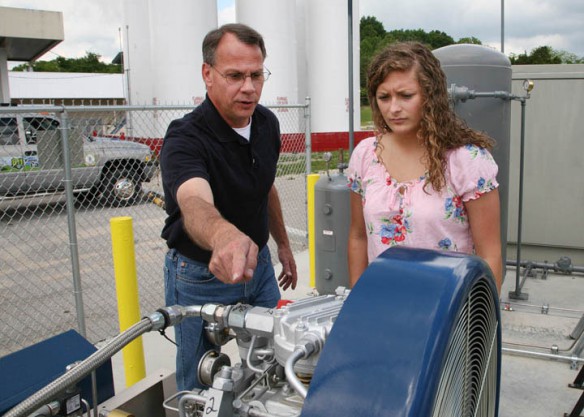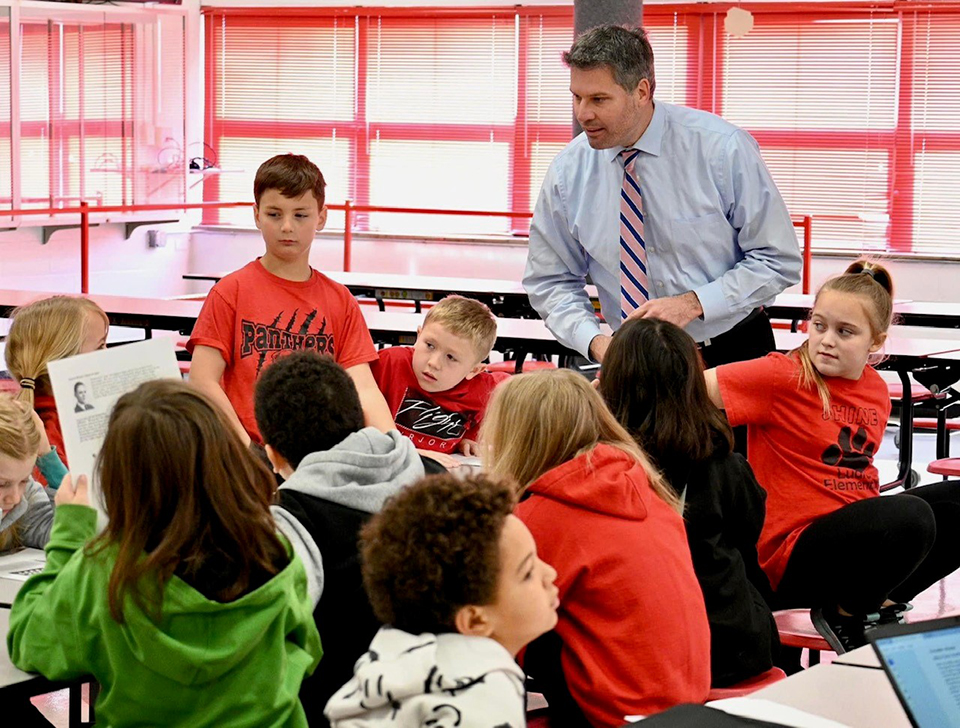
David Hargis, left, Somerset Fuel Center Manager, explains natural gas fueling processes to Maci New, the first student to sign up for Pulaski County Area Technology Center’s natural gas pipeline technician program.
Photo by Tim Thornberry, May 23, 2014
By Tim Thornberry
tim.thornberry@education.ky.gov
Beth Hargis knows how important partnerships are to the success of Career and Technical Education (CTE) programs. It is the foundation on which the programs are built, she said.
As principal of the Pulaski County Area Technology Center (ATC), Hargis has enjoyed partnerships between local business and industry, local government and the local community college.
Those relationships have gotten the ATC’s newest project off the ground. A Natural Gas Pipeline Technician Program began this year at the school, signaling the development of a program to fill not only a local need but a growing demand for technicians across the country.
“I believe this program will provide a meaningful and lasting occupation for those students who become involved,” she said.
Hargis added that with the introduction of this program at the ATC comes the recognition of it being the first of its kind in the state’s secondary education sector, and the most comprehensive program at the high school level in the country.
“We have researched this for months to make sure we have all the proper components in place to ensure success and have not found anything like it anywhere, from a secondary education standpoint,” said Hargis.
The program began as an initiative from Somerset Mayor Eddie Girdler, who was frustrated trying to hire qualified gas pipeline technicians, explained Hargis.
Somerset owns a natural gas pipeline that spans seven counties, and the city recently opened a natural gas fueling center and is moving toward a natural gas fleet of city vehicles.
“As the natural gas industry expands and those currently working in the industry retire, the ability to find qualified technicians is becoming more difficult,” Hargis said.
The American Petroleum Institute notes the oil and natural gas industry in the U.S. currently supports approximately 9.2 million jobs and expects 1.4 million additional jobs by 2030.
With the need for future technicians, Girdler not only suggested a pipeline technician program at the ATC, but the city has provided the start-up funding.
“This truly has become a team effort between the superintendents from Pulaski County and Somerset City schools, Mayor Girdler, Somerset Community College, the Office of Career and Technical Education (OCTE), and Industrial Training Services (ITS), which has provided the basis for the curriculum we will use,” said Hargis.
Maci New, a senior at Somerset High School, had the distinction of being the first student to sign up for the program. She said the opportunities presented by such a program interested her, and she felt like the program would provide a future career.
“I think this is very exciting. It’s all new and my friends are really excited for me to do this,” she said.
New said being a female in what has traditionally been a male-dominated field doesn’t deter her but gives her a sense of accomplishment.
“It’s very empowering. Being a girl, I think it makes it all the more worthwhile and satisfying when I achieve something,” she said. “There has been a lot of information to learn and a lot of hands-on activities, but I wanted to see what parts of the program interest me. I just want to make something of myself.”
New added that she likes her math and science classes a lot and much of what she has learned in those courses has benefited her in the natural gas program.
Dale Winkler, Kentucky Department of Education associate commissioner, said CTE programs have always been a way for students to take what they learn in a traditional classroom setting and put it to use in a more hands-on environment.
“I think this program will link well to the math and science curriculum the students are experiencing in their other classes, and in doing so, I think the connection will make these students better in both their academic and CTE programs,” he said.
Winkler added that the partnership that created the pipeline technician program is indicative of what happens when community agencies and their local education entities work together.
Hargis said providing such a program at the secondary level builds a strong foundation for students who wish to make it an occupation one day.
“Students that participate in a class such as this or other CTE programs have a much better idea of what they want to do as they enter college and/or the workforce,” she said. “I think having that foundation provides them a better opportunity at being successful no matter what they do.”
The Pulaski County ATC began training students from local high schools last November with classes in “Technologies Basic to the Delivery of Natural Fuel Gases” and “Preventing/Controlling Worksite Incidents.”
Officials from the local government, school systems and business associations gathered earlier in the school year at the ATC to celebrate the beginning of the program and see the lab created and designed to give students hands-on training as part of their training.
In addition to Hargis, those participating in the event included Pulaski County Schools Superintendent Steve Butcher, OCTE Policy Advisor Laura Arnold, SCC Provost Tony Honeycutt, Kentucky Gas Association Executive Director Matt Tackett, Somerset Mayor Eddie Girdler, Somerset Independent Schools Superintendent Boyd Randolph and Industrial Training Services (ITS) Executive Vice-President Jason Garland.
In 1977 ITS founder Paul Lyons answered an opportunity by the Kentucky Gas Association to create a standardized program for the gas companies in Kentucky. Since then ITS has provided consistent and documented training for the pipeline industry that includes rigorous tests that must be passed with an 80 percent score or higher in order to comply with industry requirements.
Hargis said to date her students have taken 190 of those very same industry tests with a pass rate of 98 percent.
“I think this demonstrates the strength of this program thanks to the input we have had from all of our partners and a lot of hard work from our students and instructor,” she said.
On June 4th, Hargis and New will address the Kentucky Gas Association at their annual conference in Owensboro.
Hargis said this will be a great opportunity to request program sponsors and to showcase their program to those attending the conference.



Leave A Comment